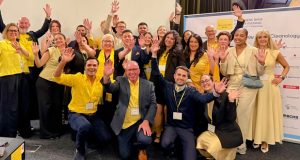A highly-skilled workforce leads to better results – this is an indisputable fact. Boosting productivity boosts returns and overall job satisfaction, so the need for training at all levels of the FM sector should always be on the minds of everybody involved; not just those in senior roles.
The unfortunate truth is that FM has developed an uncomfortable reputation for being focused solely on the bottom line. Profits drive business, and sometimes this can lead to those higher on the food chain neglecting the need for betterment.
But where do you even begin? From both a candidate and hiring organisation perspective, the variety of qualifications can seem overwhelming. There’s traditional HE avenues such as degrees, focused Health & Safety qualifications, the MAPM – to name a few.
For workers, seeking out guidance and training is a must. While 27 per cent of employees may say that their current employer doesn’t offer the opportunities needed to develop, there are possibilities that can be sought first-hand. This can be as easy as asking colleagues for guidance; there is always an opportunity for people to develop.
BIFM membership, for example, is a cost-effective way to pursue training in the specific areas that workers need it most. The reality is that any hiring organisation will look for a candidate who has done personal training in the previous 12 months, and if professionals aren’t willing to seek improvement, then they are likely to be overlooked for those who are.
Of course, the responsibility doesn’t rely solely on workers. During the onboarding process, companies should invest, on average, between £2,000 – £4,000 on training for entry-level staff, to ensure a high quality of work and facilitate a mentality of development. More should then be invested on an annual basis, to maintain standards. Particularly with an exponentially growing Millennial workforce – a group who value growth within their roles – the need for training is more important than ever.
I’ve seen over my career in FM and recruitment that training is one of the key ways in which a company can maximise retention among new hires. It costs more to neglect training than it does to encourage it, because employees will leave once they realise there’s no room for development. Essentially, if a company doesn’t train their staff, then they’re taking advantage of other companies that have previously done so.
In a candidate’s job search, the need for qualifications can be a pressing issue; certain jobs in positions of responsibility need appropriate certification for a worker to even qualify. An Estates Manager for a hospital, for instance, wouldn’t get through the door without a Health & Safety qualification.
A focus on experience is becoming an outdated view in the modern work landscape. As much as years of earned knowledge will help workers to perform from a position of expertise, hiring organisations won’t choose somebody who doesn’t possess the correct certificates; they’re avoiding risk. In the modern world of automation, time-served
is defunct – pursue training, and make yourself an attractive hire.
 THE HR EXPERT’S VIEW
THE HR EXPERT’S VIEW
CLAIRE HUISH MCIPD,
COLLEAGUE SERVICES MANAGER AT BENNETT HAY
As a highly people-centric industry, FM managers are well aware of the importance of having well trained service staff. In such a competitive job market, the talent pool can often become smaller and smaller, so those in the sector should start looking inwards if they hope to avoid a shortage of skilled workforce.
Rather than hiring new people, it can be extremely valuable to identify those already in the company who could do with upskilling and training. Homegrown talent is an investment which gets better with time. Rather than expensive recruitment initiatives and headhunting which can be very costly, it’s worth increasing the initial investment of training and developing a team that will have more longevity.
Every company should have some sort of learning and development programme, after all, those who fail to grow can never thrive. At Bennett Hay we like to take a ground-up approach to ensure each member of the team is well-equipped to deal with the varied needs of our clients.
The starting point is our Transformation Academy which takes transferring teams on the guest journey, opens their eyes to the Bennett Hay values and standards of service, and gives them insights into individual personalities which help them to better understand their colleagues as well as our guests.
Our Front of House team is then immersed in our concept of boutique hotel style service in the corporate world through a series of workshops focussing on specific topics such as Service Excellence and Positive Communication.
Alongside this, earlier this year, we launched our Leadership Academy which supports the continued development of our front-line managers. This bespoke programme is founded on the principles of the Bennett Hay way of management, reinforcing our values with a strong focus on positive performance management and delivering our standards of service. Over 50 per cent of the attendees on this year’s programme are managers who have been promoted from within Bennett Hay.
Through these initiatives we are not only able to create our own internal talent pool, but actually increase colleague retention rates by showing that we care and place emphasis on their personal and professional development.
The remit of FM professionals is constantly shifting, merging and adapting, so it’s important that staff are equipped to deal with this. Development should therefore be an ongoing pursuit rather than a quick injection every now and then. Development plans should be put in place and regularly reviewed to ensure people are progressing and that any issues are dealt with quickly.
We aim to promote from within whenever possible and have a number of colleagues who joined us early in their career and have climbed the ladder at Bennett Hay. By investing in them, we have been able to retain and develop a highly skilled workforce who is well versed in the vision and ethos of our company. This has allowed us to avoid the pitfalls of a shortage of skilled employees and the barriers to success it presents.
The key thing to remember is not to sacrifice short-term gain for longevity and remember to invest in your most important asset, your people. Nurturing and developing from within will increase productivity, boost employee engagement and allow you to thrive even when there is a shortage of talent.





